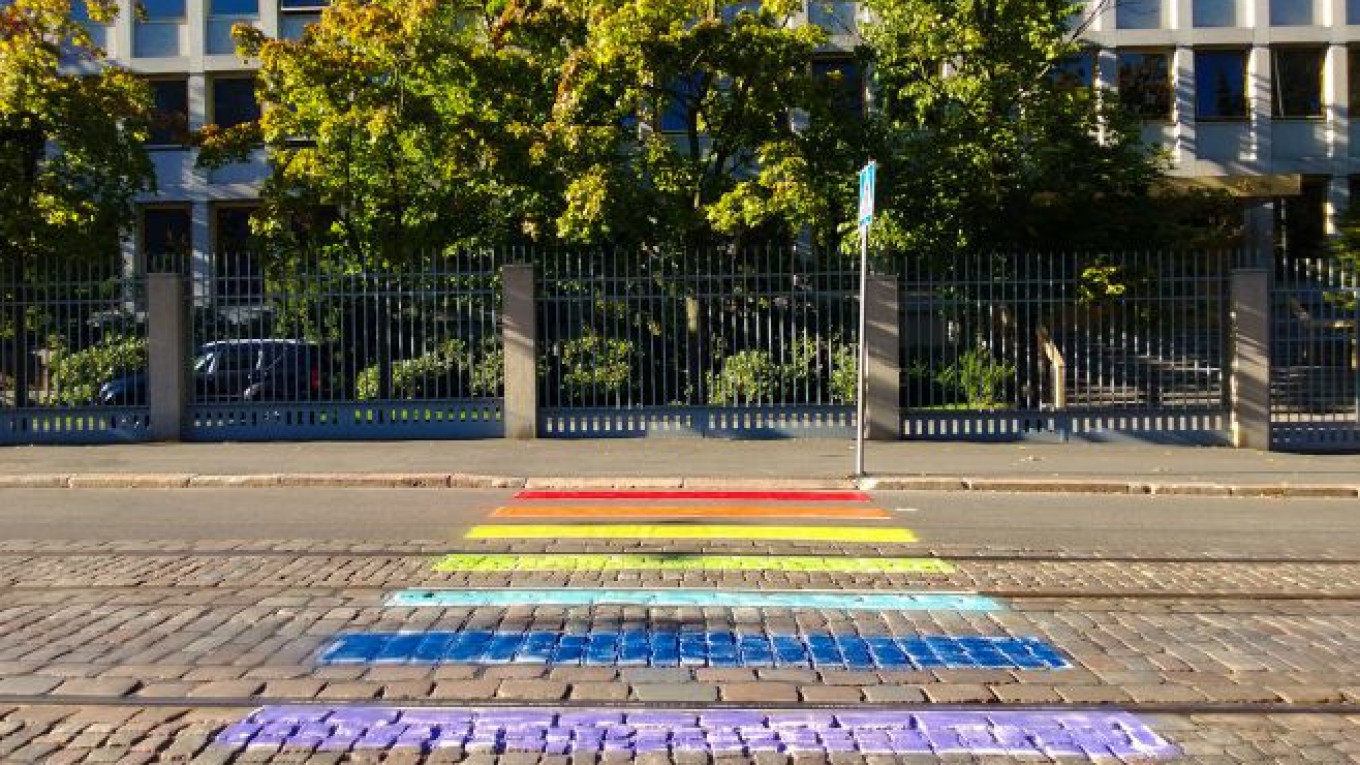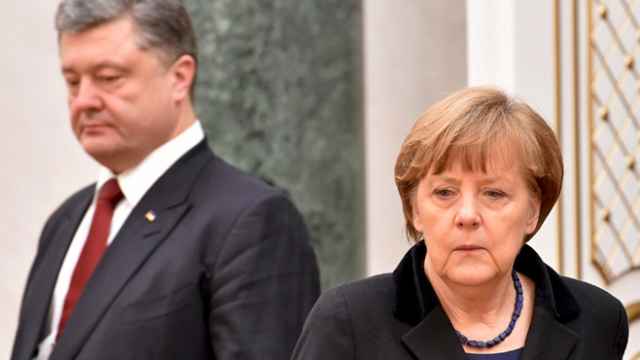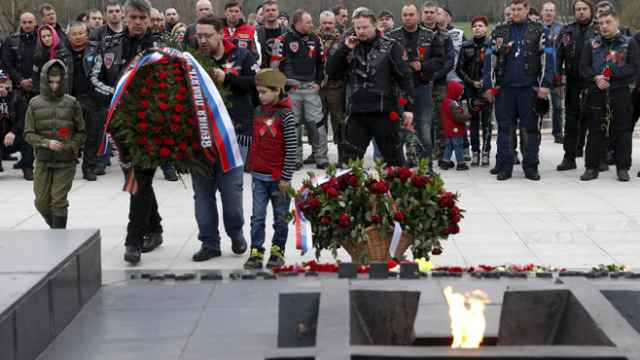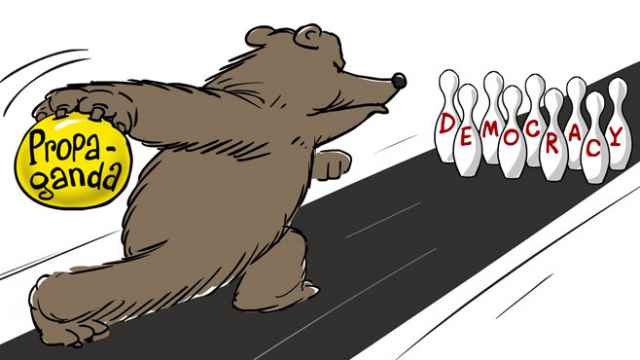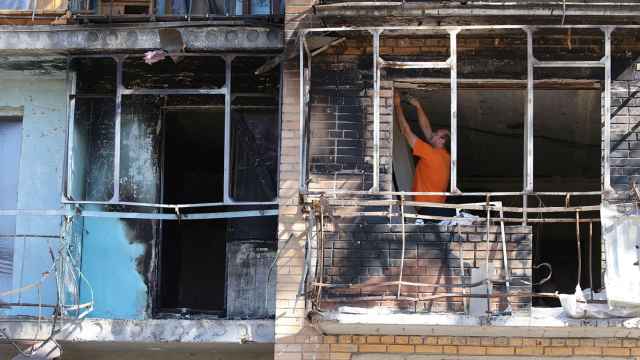With the attention garnered by the recent publication on YouTube of a hidden-camera experiment in which two young men hold hands as they walk through central Moscow, enduring a barrage of verbal and physical assaults from passers-by, the attitudinal gulf across which many in the West and Russia regard each other is certain to widen. While the filmmakers' earlier efforts included less serious fare — their previous clip involved girls with fake mustaches — the 6 million views that this latest video accumulated in the space of three days show that the authors have hit a nerve. The contours of the outrage are predictable enough; Western viewers will tend to condemn the spectacle of people being humiliated simply for who they are, while Russian viewers will tend to condemn the filmmakers for "provoking" public feeling. Lost in the emotional turmoil, however, is the question of just why many residents of the world's largest country — Russia — should feel so much antipathy toward such a tiny minority — homosexuals?
The truth goes beyond the usual answer, namely that homophobia is a top-down political distraction orchestrated by the government. To be sure, the administration's "traditional values" campaign has fanned the flames of hatred. Inaugurated in 2012 by Putin's lament over a "deficit of spiritual links" and a wave of official hysteria surrounding the adoption of Russian children by Americans, one of the cornerstones of the campaign has been the juxtaposition of "Holy Russia" with "sodomitic" America and "Gayropa."
But in Russia's consensual autocracy, the government is careful to only advance initiatives which it is sure will meet with popular approval. Nor is Russian society in the grip of especially conservative sexual mores — premarital sex, adultery and prostitution are as much a fact of daily life as they are in the West. Rather, homophobia is a psychological coping strategy, modeled on patterns of behavior from the Soviet period and which responds to a distinct trauma: the long-ago disintegration of the same "traditional values" that the homophobes profess to be defending.
Much like the phenomenon of pain from a phantom limb, the yearning for the values of a supposedly more pure epoch is a reaction to the catastrophic state of gender and domestic relations inside Russia. Widespread domestic abuse is only the most extreme end result of a deeply patriarchal society in which a woman's energies are supposed to be dedicated to finding and keeping a husband, no matter how poorly he treats her. Although the Russian government keeps no official statistics on victims of domestic violence, the authorities have estimated that anywhere from 10,000 to 14,000 women are murdered every year by their husbands or partners; by comparison, in the United States, a country with a population twice the size of Russia's, 1,000 to 2,000 women a year are murdered by partners or family members.
The situation for the other pillar of the household trinity, the children, is hardly less bleak. The horrific plight of disabled and abandoned children in the country's orphanage system is all too well-known. But substance abuse, poverty, and violence haunt many other young people. As recently as 2013, the government acknowledged that Russia had Europe's highest rate of teenage suicide; this year, the head of Moscow's anti-suicide hotline stated that the number of calls for help regarding adolescents had not changed since then. If the situation in Moscow is serious, one can imagine the conditions that prevail in more depressed areas like southern Russia or the Urals.
Finally, the extent to which the restoration of "traditional values" is a fairy tale totally out of touch with the reality of Russian society is evident in the grim figures from the country's HIV epidemic. The number of people infected with HIV has doubled to almost 1 million since 2010 and could reach 3 million by 2015. These are increases that Vadim Pokrovsky, chief of Russia's Federal AIDS Center, attributes mainly to unprotected heterosexual sex.
Gays and lesbians would seem to have little to do, then, with Russia's plagues of disease, hopelessness and violence. But old habits die hard; in the Soviet Union, people were rarely encouraged to look for the actual sources of the country's problems, with the guilty parties instead being sought among fictional "wreckers" and "fifth columnists." Moreover, any "deviation" from the norm, whether biological or ethnic, was treated as an inherently ideological choice; millions suffered state-sponsored persecution merely because of their class background or ethnicity.
According to this ingrained logic, homosexuality is not just about genetics or sexual preference, but represents a form of political dissent. And just as the Soviet Jews' enthusiasm for the foundation of Israel in 1948 provided a pretext to convert traditional anti-Semitism into a decades-long "anti-cosmopolitan" campaign, so too has popular discomfort with the gradual emergence of homosexuals from the closet now been used to create a new class of "enemies of the state" in Russia. On a deeper level, at a time of general decay and crisis, homosexuals, "flaunting" their individuality, are seen to be the most "insolent" violators of collective solidarity and therefore the most likely culprits for the collective's corrosion.
While many outsiders might be tempted to dismiss the fixation on homosexuality in Russia as yet another example of the country's inscrutability, the enthusiasm for homophobia has its roots in very specific Russian problems and is expressed in a manner reflecting Russia's distinct intellectual heritage. That does not change the fact that homophobia, like anti-Semitism before it, remains the "socialism of fools."
Andrew Kornbluth is a doctoral student at the University of California at Berkeley.
A Message from The Moscow Times:
Dear readers,
We are facing unprecedented challenges. Russia's Prosecutor General's Office has designated The Moscow Times as an "undesirable" organization, criminalizing our work and putting our staff at risk of prosecution. This follows our earlier unjust labeling as a "foreign agent."
These actions are direct attempts to silence independent journalism in Russia. The authorities claim our work "discredits the decisions of the Russian leadership." We see things differently: we strive to provide accurate, unbiased reporting on Russia.
We, the journalists of The Moscow Times, refuse to be silenced. But to continue our work, we need your help.
Your support, no matter how small, makes a world of difference. If you can, please support us monthly starting from just $2. It's quick to set up, and every contribution makes a significant impact.
By supporting The Moscow Times, you're defending open, independent journalism in the face of repression. Thank you for standing with us.
Remind me later.


